For years, people have searched for the best meal to clean arteries, typing queries like “foods that unclog arteries fast”, “meal to reverse plaque buildup”, and “diet to clear blocked arteries naturally”. The internet is filled with bold promises: garlic drinks, lemon detoxes, miracle smoothies, or one-time “artery cleanse meals.”
But here’s the truth: no single food or meal can instantly unclog your arteries. Arterial plaque develops slowly, and its reversal — if at all possible — requires consistent dietary patterns, lifestyle changes, and sometimes medications. Leading cardiology bodies, including the American Heart Association (AHA), emphasize that long-term diet patterns like the Mediterranean or DASH diet protect arteries far more effectively than any so-called “artery cleansing meal.”
Why “Artery Cleansing Meals” Don’t Exist
The Biology of Plaque Buildup
Arteries don’t get clogged overnight. Plaque is made of cholesterol, fat, calcium, and inflammatory cells. Over time, it narrows the vessel and increases the risk of heart attack or stroke. Eating one “miracle food” doesn’t suddenly wash this away.
What Actually Works
Clinical studies show that consistent intake of heart-healthy foods — like soluble fiber from oats and legumes, plant sterols, olive oil, walnuts, and leafy greens — can reduce LDL cholesterol, lower blood pressure, and decrease cardiovascular risk. But these benefits come from daily patterns, not a one-time meal.
Myth-Busting Popular “Artery Cleanse” Claims
Garlic, Lemon, and Ginger Drinks
You’ll find endless YouTube videos and blog posts claiming a daily mix of garlic, lemon, or ginger can clean your arteries overnight. The evidence? Weak at best. While garlic and citrus have general heart benefits, no RCTs prove that these drinks reverse plaque. Using these alone without proven diet and medication can delay life-saving treatment.
Miracle Detox Meals
Detox salads or “artery cleanse soups” may be nutritious, but framing them as artery cleaners is misleading. They’re beneficial because they are high in fiber, antioxidants, and healthy fats, but they don’t scrub plaque away like soap on a pipe.
What Science Says About Diet and Artery Health
- Mediterranean Diet: Reduced major cardiovascular events in clinical trials. Rich in olive oil, nuts, whole grains, legumes, and fish.
- DASH Diet: Clinically proven to lower blood pressure, especially with reduced sodium intake.
- Oats & Barley (β-glucan): About 3 g/day soluble fiber can lower LDL cholesterol.
- Plant Sterols/Stanols: About 2 g/day lowers LDL by 9–12%.
Key Takeaway for Readers
The next time you search for “the best meal to clean out arteries”, remember:
- One meal won’t fix plaque buildup.
- Long-term dietary patterns like Mediterranean and DASH are proven to work.
- Specific foods — oats, barley, beans, nuts, olive oil, leafy greens — contribute to better cholesterol and blood pressure.
- Myths like garlic drinks or miracle detoxes don’t hold up under science.
How to Build the Best Meal to Clean Arteries (Science-Backed Framework)
Millions search daily for “meal plan for clogged arteries”, “foods that unclog arteries naturally”, and “artery cleanse diet”. Instead of miracle recipes, here’s a hero meal framework — a single plate you can build daily, backed by clinical research and adaptable to your culture and budget.
The Science-Backed Ingredients of an Artery-Friendly Meal
1. Soluble Fiber Base (Oats, Barley, Legumes)
- Why it works: Soluble fiber (β-glucan) binds bile acids, lowering LDL cholesterol.
- Evidence: 3 g/day of β-glucan lowers LDL by 5–10%.
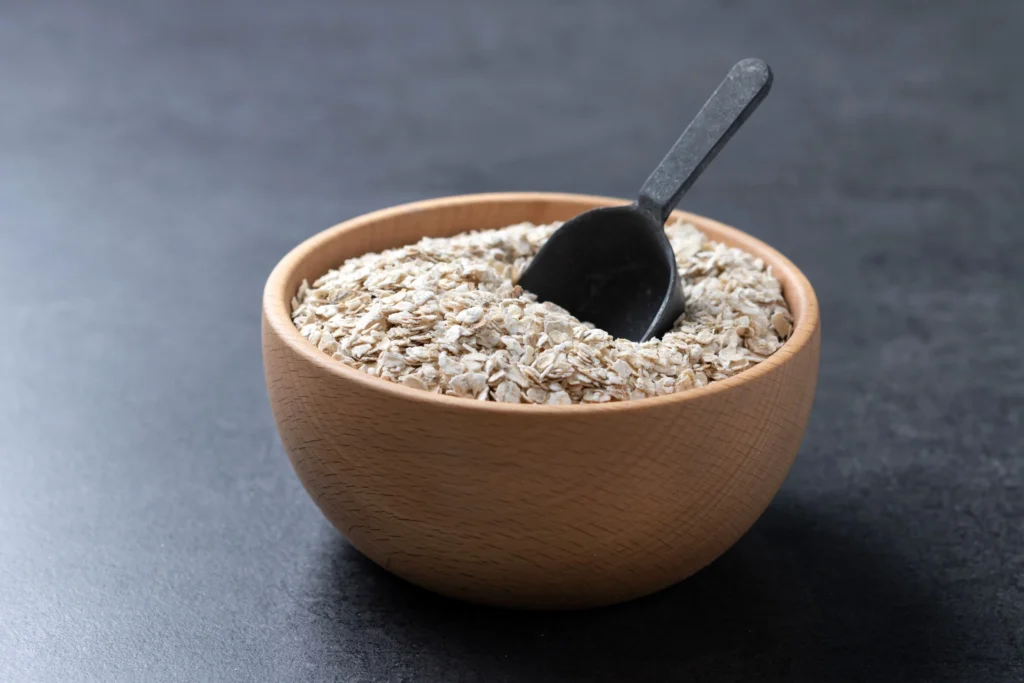
2. Heart-Healthy Fats (Olive Oil, Walnuts, Seeds, Fatty Fish)
- Why it works: Replacing saturated fat with MUFAs (olive oil) or PUFAs (omega-3s, walnuts, flax) reduces cardiovascular risk.
- Evidence: The Mediterranean diet reduced heart attacks and strokes in randomized trials.
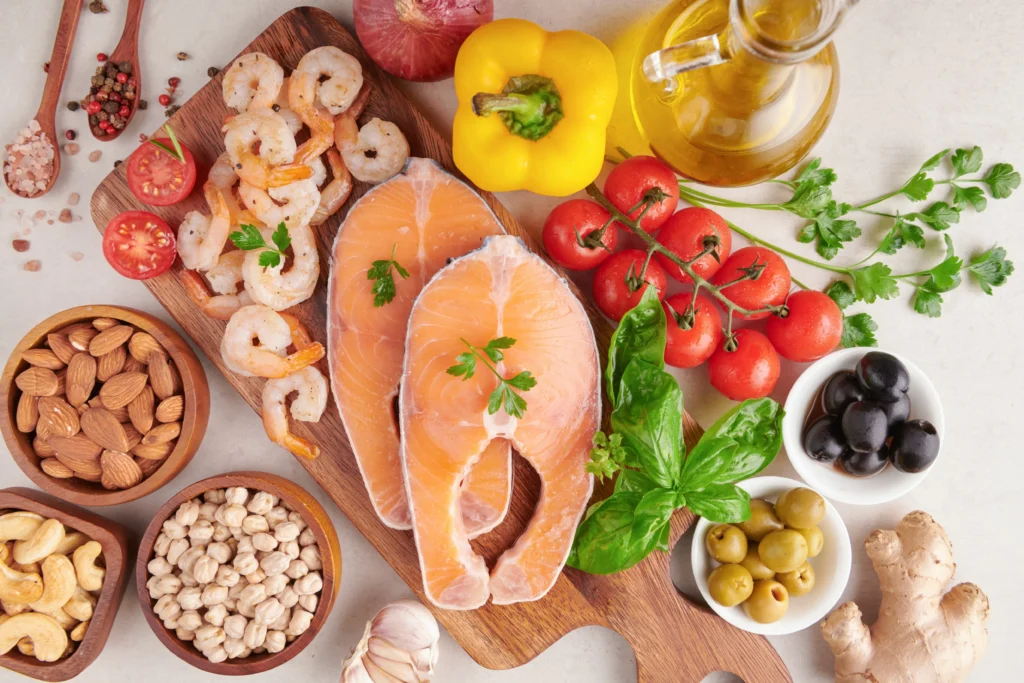
3. Leafy Greens and Colorful Vegetables
- Why it works: Leafy greens (spinach, rocket, kale) provide nitrates that help widen arteries and reduce blood pressure. Tomatoes deliver lycopene, linked to reduced LDL oxidation.
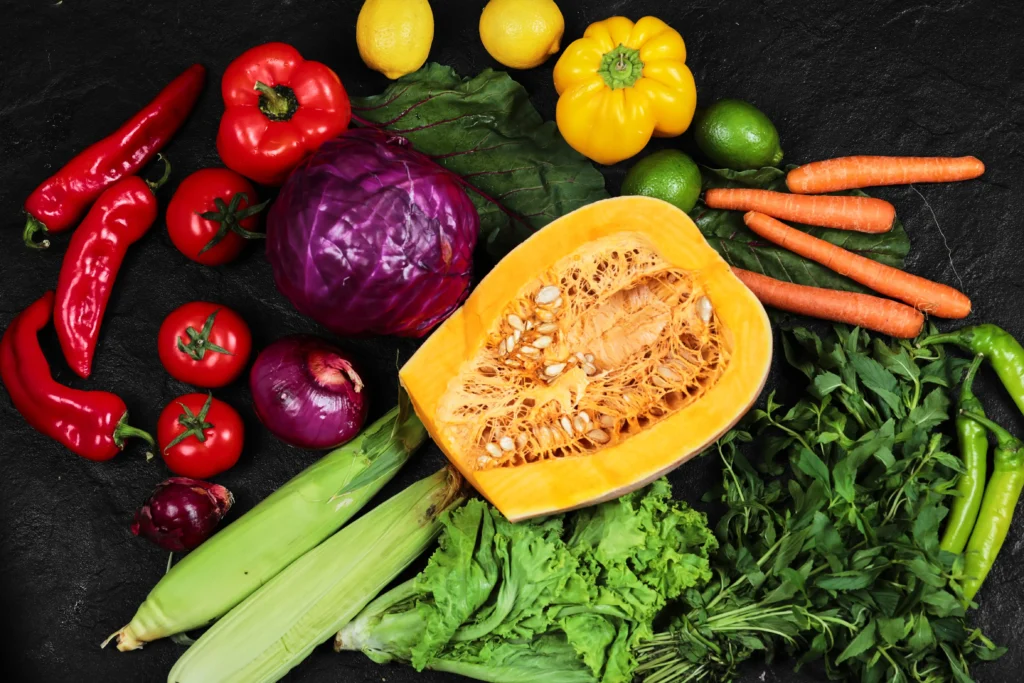
4. Plant Sterols or Stanols
- Why it works: 2 g/day of plant sterols can lower LDL cholesterol by 9–12%. Found in fortified spreads, yogurts, or supplements.
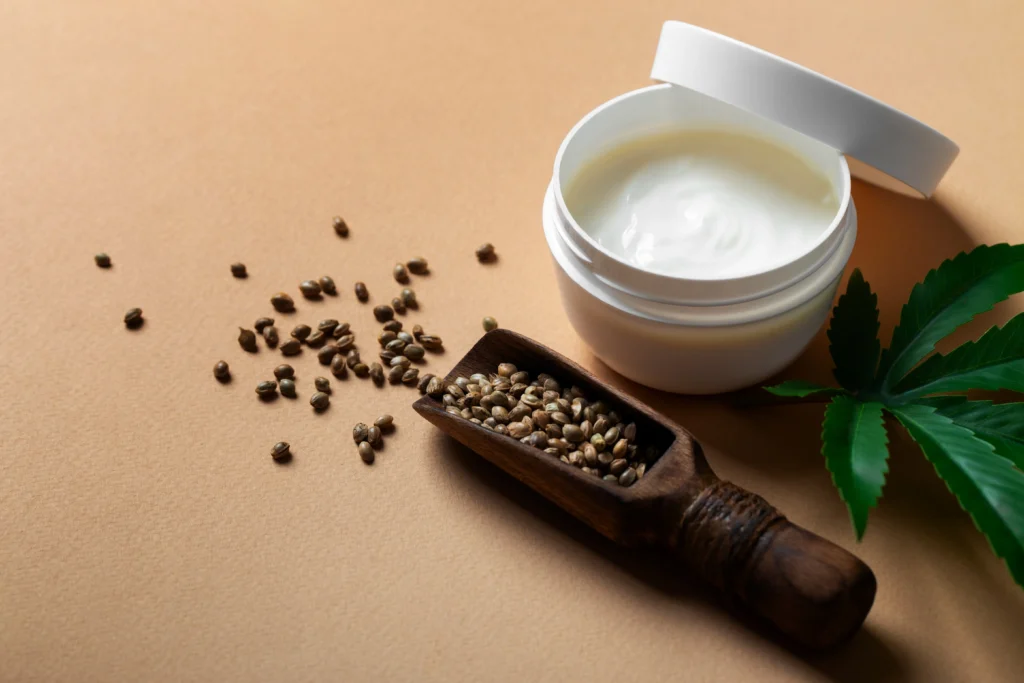
5. Low Sodium, Flavor-Rich Herbs
- Why it works: Reducing sodium lowers blood pressure, a major driver of artery health. Replace salt with herbs, garlic, turmeric, black pepper, and lemon for flavor.
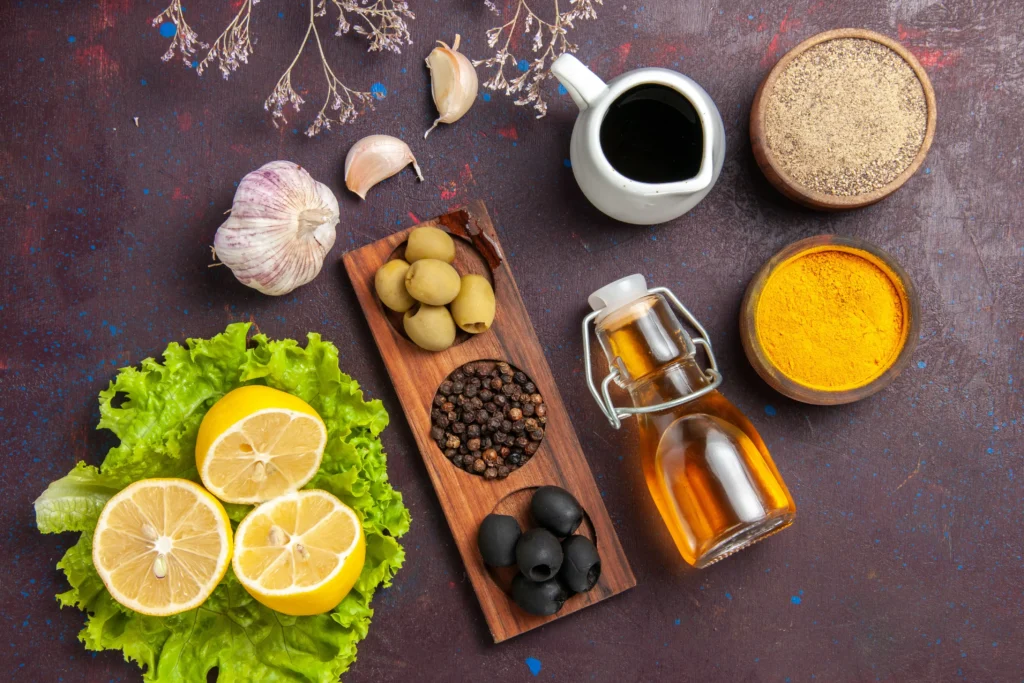
The Artery-Friendly “Hero Bowl” Blueprint
Here’s how to assemble your plate so your arteries love it:
- Base: 1 cup cooked oats or barley OR 1 cup of lentils/beans.
- Protein & Fats: Add salmon/sardines (for omega-3s) OR a handful of walnuts, flax, chia.
- Vegetables: At least 2 cups of leafy greens + 1–2 tomatoes, peppers, or carrots.
- Dressing: 1–2 tbsp extra-virgin olive oil + herbs, garlic, lemon.
- Optional add-on: A plant sterol-fortified yogurt or margarine spread on whole-grain bread.
Regional Variations (So Everyone Can Try)
Indian Version
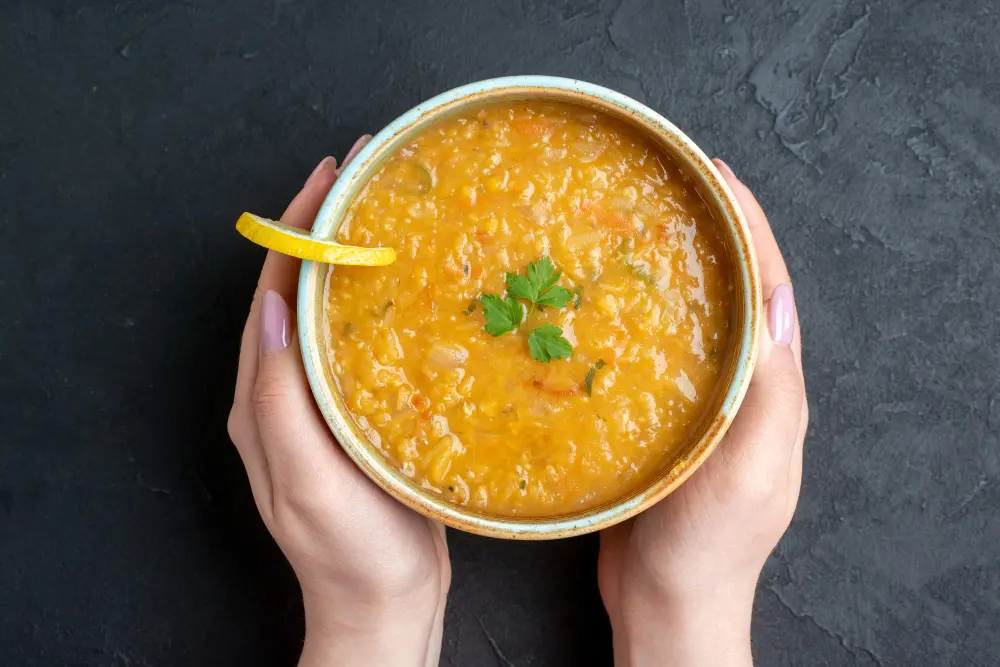
- Base: Moong dal khichdi with barley or oats.
- Protein: Sprouted lentils + walnuts.
- Veggies: Spinach (palak), tomato, carrot.
- Oil: Mustard oil swapped with olive oil drizzle.
Middle Eastern / Mediterranean Version
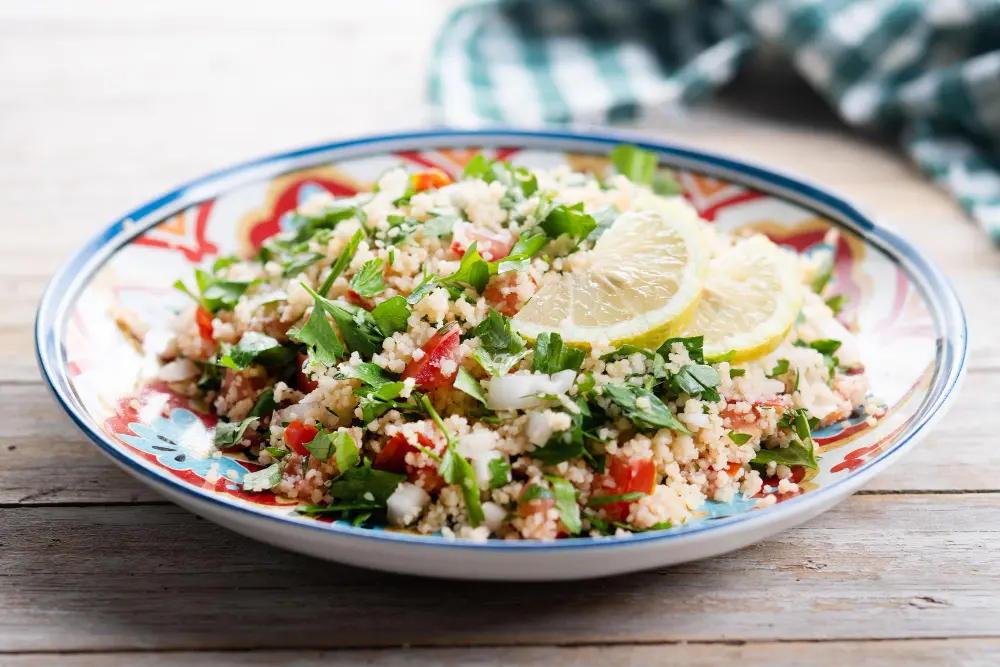
- Base: Barley tabbouleh with chickpeas.
- Protein & Fats: Walnuts, olive oil, tahini.
- Veggies: Parsley, rocket, tomato, cucumber.
Western Version
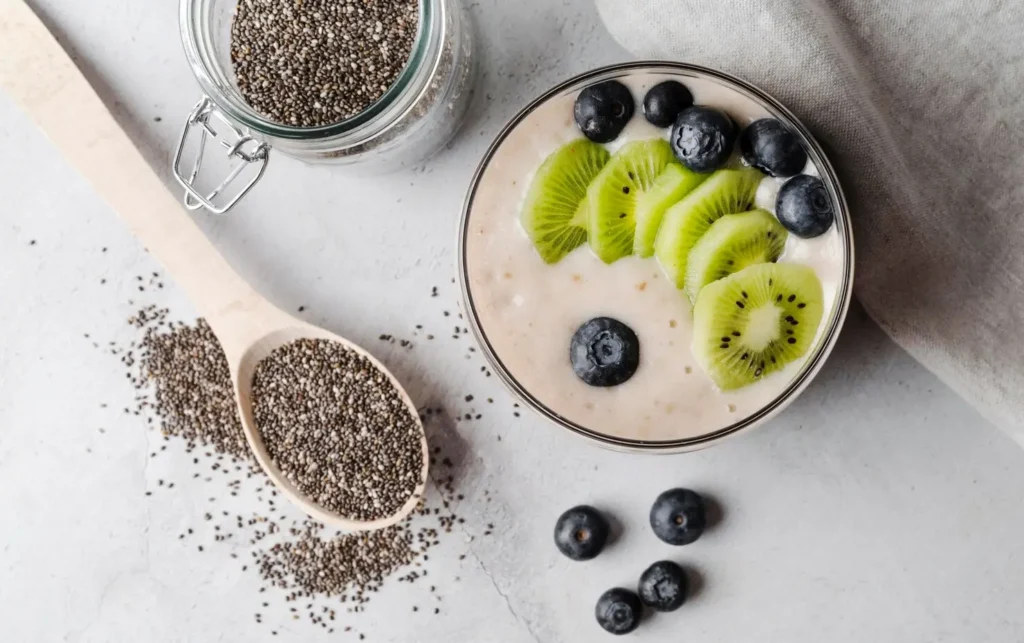
- Base: Overnight oats with chia and flax.
- Protein: Walnuts + Greek yogurt (plant sterol fortified).
- Veggies: Spinach omelet on the side with olive oil.
East Asian Version
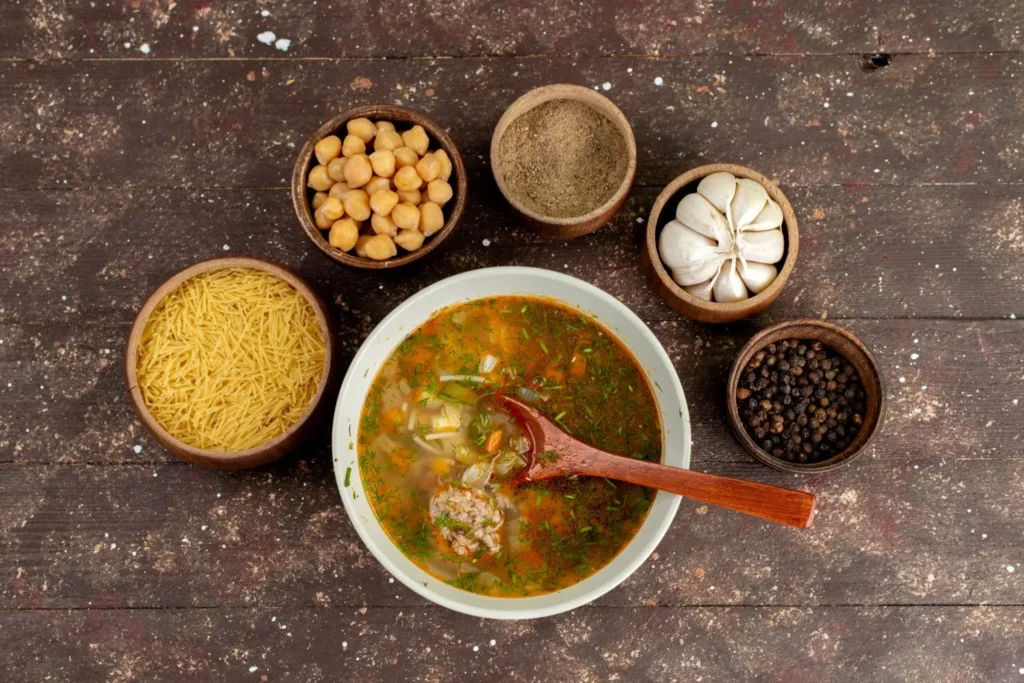
- Base: Brown rice + edamame + miso barley soup.
- Protein: Tofu with sesame seeds.
- Veggies: Bok choy, spinach, seaweed.
What Makes This a “#1 Meal to Clean Arteries”
- Targets cholesterol: Soluble fiber + plant sterols lower LDL.
- Protects arteries: Olive oil and walnuts supply anti-inflammatory fats.
- Lowers blood pressure: Greens + DASH-style low sodium.
- Proven by trials: PREDIMED (Mediterranean diet) & DASH (blood pressure) results.
If you want the best meal for arteries, don’t look for a quick fix. Instead:
- Build your daily meals using fiber-rich grains, legumes, healthy fats, greens, and plant sterols.
- Adapt it to your culture, budget, and taste.
- Stick to it consistently — that’s what keeps arteries flexible, lowers cholesterol, and reduces heart risk.
Worst Foods That Clog Arteries vs. the Best Meal to Clean Arteries
When people search for “worst foods for your arteries” or “foods that cause blocked arteries”, they’re usually worried about everyday diet choices. And the evidence is clear: some foods accelerate plaque buildup, raise LDL cholesterol, and increase blood pressure. The good news? For every artery-clogging food, there’s a proven replacement that supports heart health.
Top Foods to Limit for Artery Health
1. Trans Fats and Partially Hydrogenated Oils
- Found in: Packaged snacks, fried fast foods, baked goods.
- Why it’s bad: Trans fats increase LDL (“bad”) cholesterol and lower HDL (“good”) cholesterol — the worst possible combo.
- Better swap: Nuts, seeds, olive oil, or avocado spread.
2. Saturated Fat from Processed Meats & Butter
- Found in: Bacon, sausages, hot dogs, butter-heavy recipes.
- Why it’s bad: High saturated fat intake raises LDL, contributing to atherosclerosis.
- Better swap:
- Replace butter with extra-virgin olive oil or canola oil.
- Replace processed meats with beans, lentils, grilled fish, or skinless chicken.
3. Refined Carbs and Sugary Foods
- Found in: White bread, pastries, soda, candy.
- Why it’s bad: Spikes blood sugar → raises triglycerides → promotes plaque buildup.
- Better swap: Whole grains like oats, barley, quinoa, or fruits for sweetness.
4. Excess Sodium (Salt)
- Found in: Instant noodles, canned soups, chips, processed sauces.
- Why it’s bad: High sodium raises blood pressure, stiffens arteries, and increases stroke risk.
- Better swap: Season with herbs, garlic, lemon, turmeric, or black pepper.
5. Fried and Ultra-Processed Foods
- Found in: Deep-fried street foods, frozen dinners, chips.
- Why it’s bad: High in saturated/trans fats, refined oils, and sodium.
- Better swap:
- Oven-baked or air-fried versions.
- Fresh home-cooked meals with olive oil or avocado oil.
6. Excessive Red Meat & Full-Fat Dairy
- Found in: Steaks, burgers, whole milk, cream.
- Why it’s bad: Contributes to high cholesterol and saturated fat intake.
- Better swap:
- Lean proteins like fish, legumes, tofu.
- Dairy alternatives: low-fat yogurt, almond or oat milk.
Artery-Friendly Swaps You Can Start Today
| Unhealthy Food | Why It Hurts Arteries | Better Swap |
|---|---|---|
| Fried chicken | Trans + saturated fat | Grilled chicken or baked tofu |
| White bread | Refined carbs, no fiber | 100% whole grain or oat bread |
| Bacon/sausages | Processed + sodium | Lentil curry, chickpea salad |
| Butter spread | High saturated fat | Olive oil drizzle or avocado |
| Soda & sweets | Sugar → high triglycerides | Sparkling water + fresh fruit |
| Instant noodles | Sodium overload | Brown rice + veggies, low-salt broth |
Global Examples of Artery-Harming Foods
- Indian: Fried pakoras, creamy curries with ghee → swap with dal + olive oil tempering.
- Middle Eastern: Shawarma with fatty cuts → swap with grilled chicken + hummus.
- Western: Cheeseburgers with fries → swap with grilled salmon + quinoa salad.
- East Asian: High-salt ramen → swap with miso-barley soup + leafy greens.
Why Replacement Matters More Than Elimination
The AHA emphasizes that replacing saturated/trans fats with unsaturated fats is more effective than just cutting fat. For example, switching from butter to olive oil lowers risk more than going “low-fat everything.”
Key Takeaway
To protect your arteries:
- Avoid trans fats, processed meats, excess sodium, refined carbs, and fried foods.
- Replace them with whole grains, legumes, nuts, olive oil, fish, and leafy greens.
- Think “swap,” not “starve” — sustainable changes are the real artery cleanse diet.
How to Keep Arteries Healthy Beyond Diet
Most people search for “foods to unclog arteries”, but fewer realize that lifestyle factors matter just as much as diet. Even the best artery-cleanse meal won’t work if paired with poor sleep, chronic stress, or smoking. Clinical research shows that diet + lifestyle bundles (like the DASH or Mediterranean pattern plus exercise, no smoking, and stress management) lower cardiovascular risk more than food changes alone.
Exercise — The Natural Artery Booster
Why Movement Matters
- Physical activity raises HDL (“good”) cholesterol and improves blood vessel flexibility.
- Regular aerobic exercise reduces blood pressure, improves insulin sensitivity, and lowers inflammation.
Evidence-Based Recommendations
- 150 minutes per week of moderate aerobic activity (walking, swimming, cycling).
- Or 75 minutes per week of vigorous activity (running, HIIT).
- 2+ strength-training sessions per week for added metabolic benefits.
- Tip: Even brisk 10-minute walks after meals reduce blood sugar spikes and support artery health.
Sleep and Artery Health
The Power of Rest
- Poor sleep (less than 6 hours) is linked to higher blood pressure, insulin resistance, and arterial stiffness.
- Sleep apnea increases risk of heart disease due to low oxygen levels at night.
Action Steps
- Aim for 7–9 hours per night of consistent, good-quality sleep.
- Create a dark, cool, device-free bedroom environment.
- Seek medical evaluation if snoring, choking at night, or excessive fatigue (possible sleep apnea).
Stress, Mindset, and Artery Health
Why Stress Hurts Arteries
- Chronic stress elevates cortisol and adrenaline → raises blood pressure, promotes inflammation.
- Emotional stress can trigger “broken heart syndrome” (Takotsubo cardiomyopathy).
Stress-Relief Strategies
- Meditation, yoga, deep breathing lower stress hormones and blood pressure.
- Hobbies, social support, gratitude journaling protect long-term cardiovascular health.
Smoking, Alcohol, and Arteries
Smoking — The #1 Enemy of Arteries
- Smoking directly damages artery walls, accelerates plaque buildup, and reduces oxygen delivery.
- Even secondhand smoke contributes to cardiovascular disease.
Alcohol — Risk vs. Reality
- Heavy drinking raises blood pressure, triglycerides, and stroke risk.
- If you drink, limit to ≤1 drink/day for women, ≤2 for men — or avoid altogether.
When Lifestyle Changes Aren’t Enough
Even the perfect artery-cleanse diet and lifestyle may not fully reverse plaque. Many people still need medications such as statins, ezetimibe, or PCSK9 inhibitors. Ignoring this can be dangerous.
- If you’ve had a heart attack, stroke, or high LDL (>190 mg/dL), lifestyle alone is not enough.
- Always work with your doctor before changing treatment.
Red-Flag Symptoms That Need Urgent Care
Call a doctor immediately if you experience:
- Chest pain or pressure.
- Sudden shortness of breath.
- Dizziness, fainting, or weakness on one side of the body.
- Severe headache or vision problems.
👉 Lifestyle and diet are powerful tools — but medical emergencies require immediate professional care.
Keeping arteries clean isn’t just about what you eat. To truly protect your heart:
- Exercise regularly (aerobic + strength).
- Sleep well (7–9 hours).
- Manage stress (yoga, meditation, social support).
- Quit smoking and limit alcohol.
- See a doctor if you’re high risk or have warning symptoms.
7-Day Meal Plan and Daily Routine for Artery Health
You’ve learned that no single “detox” food magically cleans arteries. Instead, the real secret is consistent meals + healthy habits. This 7-day artery-friendly action plan combines everything: oats, legumes, olive oil, leafy greens, nuts, plant sterols, low sodium, exercise, sleep, and stress care.
Core Rules of the Action Plan
- Fiber first: Oats, barley, beans, lentils daily.
- Healthy fats: Olive oil, walnuts, flax, chia, fatty fish 2–3x/week.
- Vegetables: 5+ servings/day (especially leafy greens).
- Sodium swap: Herbs + lemon instead of salt.
- Plant sterols: 2 g/day from fortified yogurt/spreads (if available).
- Exercise: 30 minutes/day brisk walk or cycling.
- Sleep: 7–9 hours nightly.
- Stress: Daily meditation or breathing routine.
7-Day Best Meal to Clean Arteries Plan
Day 1
- Breakfast: Overnight oats with chia, walnuts, blueberries, and low-fat yogurt (plant sterol fortified).
- Lunch: Lentil-barley soup with spinach and tomatoes, olive oil drizzle.
- Snack: Handful of walnuts + apple.
- Dinner: Grilled salmon with quinoa, steamed broccoli, and lemon-turmeric dressing.
Day 2
- Breakfast: Vegetable upma with barley, peas, and carrots.
- Lunch: Chickpea salad with olive oil, rocket leaves, cucumbers, and tomato.
- Snack: Carrot sticks + hummus.
- Dinner: Stir-fried tofu with bok choy and brown rice, sesame garnish.
Day 3
- Breakfast: Oat porridge topped with banana, flax seeds, and cinnamon.
- Lunch: Mediterranean bowl — quinoa, chickpeas, spinach, olive oil, walnuts, tomato.
- Snack: Low-fat yogurt with berries.
- Dinner: Grilled sardines with whole-grain pasta, garlic, and tomato sauce.
Day 4
- Breakfast: Masala oats with spinach and coriander.
- Lunch: Red kidney bean curry (rajma) with brown rice and side salad.
- Snack: Almonds + orange.
- Dinner: Grilled chicken with barley pilaf and roasted carrots.
Day 5
- Breakfast: Barley khichdi with moong dal and vegetables.
- Lunch: Lentil soup with kale and tomato + whole-grain bread.
- Snack: Handful of walnuts and raisins.
- Dinner: Baked salmon with quinoa, spinach, and olive oil dressing.
Day 6
- Breakfast: Green smoothie (spinach, oats, banana, flax seeds).
- Lunch: Chickpea wrap in whole-wheat tortilla with avocado and lettuce.
- Snack: Walnuts + low-fat yogurt.
- Dinner: Grilled tofu with miso-barley soup and steamed bok choy.
Day 7
- Breakfast: Overnight oats with chia seeds, strawberries, and walnuts.
- Lunch: Mediterranean chickpea salad with rocket, tomatoes, cucumbers, olive oil.
- Snack: Carrot sticks + hummus.
- Dinner: Grilled fish with quinoa, spinach, and lemon-garlic sauce.
Daily Routine Checklist for Artery Health
- Morning: 10-minute brisk walk + balanced breakfast with oats.
- Midday: At least 2 servings of vegetables with lunch.
- Afternoon: Swap fried snacks for nuts/fruit.
- Evening: 20-30 minutes of physical activity (walk, jog, yoga).
- Night: Early light dinner + 7–9 hours of sleep.
- Anytime: Stress check — 5 minutes deep breathing.
Shopping List for Artery-Friendly Eating
- Whole grains: Oats, barley, quinoa, brown rice.
- Legumes: Lentils, chickpeas, kidney beans.
- Fats: Extra-virgin olive oil, walnuts, flax, chia.
- Proteins: Salmon, sardines, chicken breast, tofu.
- Vegetables: Spinach, kale, rocket, broccoli, carrots, tomatoes.
- Fruits: Berries, apples, bananas, oranges.
- Fortified foods: Plant sterol yogurt/spread (if available).
- Spices & herbs: Garlic, turmeric, coriander, parsley, lemon.
The best meal for arteries is not one dish — it’s a pattern you repeat daily. This 7-day meal plan and lifestyle routine gives you:
- Lower LDL cholesterol and triglycerides.
- Better blood pressure and circulation.
- Sustainable, tasty, and cultural flexibility.
FAQs About Artery Health and Food
Q1. Can one meal clean out your arteries?
No. There is no single meal that unclogs plaque instantly. Arteries stay healthy through consistent heart-healthy eating patterns like the Mediterranean or DASH diet.
Q2. What is the #1 best meal to clean arteries?
A science-backed “hero meal” includes oats or barley, legumes, leafy greens, tomatoes, olive oil, walnuts, and plant sterols — foods shown to lower LDL cholesterol and blood pressure.
Q3. What foods naturally unclog arteries fast?
No food works instantly, but oats, beans, nuts, olive oil, leafy greens, and fatty fish improve artery health over time.
Q4. Does oatmeal clean clogged arteries?
Oats are rich in soluble fiber (β-glucan), which lowers LDL cholesterol by 5–10% with daily intake. This supports artery health when part of a balanced diet.
Q5. How much oatmeal per day is good for cholesterol?
About 3 g of soluble fiber (β-glucan) daily — roughly one full bowl of oats — helps lower LDL cholesterol.
Q6. Are walnuts good for artery health?
Yes. Walnuts are high in omega-3s and polyunsaturated fats, which reduce inflammation and cholesterol.
Q7. Do plant sterols really unclog arteries?
Plant sterols at ~2 g/day can lower LDL by 9–12%. They don’t “unclog” arteries but reduce cholesterol levels and slow plaque buildup.
Q8. What vegetables are best for clogged arteries?
Leafy greens (spinach, kale, rocket), tomatoes (lycopene), and cruciferous veggies (broccoli) are most beneficial.
Q9. Does garlic clean out arteries?
Garlic may slightly reduce blood pressure and cholesterol, but it does not “flush” plaque. Use it as part of a balanced diet.
Q10. Is lemon water good for cleaning arteries?
Lemon water is refreshing and adds vitamin C but has no evidence of unclogging arteries. It’s helpful as part of a low-sugar hydration routine.
Q11. What is the Mediterranean diet for arteries?
It emphasizes olive oil, nuts, whole grains, fish, fruits, and vegetables. Proven in clinical trials to reduce heart attacks and strokes.
Q12. How does the DASH diet help arteries?
The DASH diet lowers blood pressure with reduced sodium and high intake of fruits, vegetables, and whole grains.
Q13. What is the best 7-day meal plan for clogged arteries?
A plan rich in oats, legumes, leafy greens, olive oil, walnuts, and fish while limiting processed meats, fried foods, and sugar.
Q14. Can I reverse plaque buildup with diet alone?
Diet can lower cholesterol and blood pressure, but advanced plaque often needs medications or procedures. Always consult your doctor.
Q15. Are smoothies good for clogged arteries?
Smoothies with oats, spinach, flax seeds, and berries are excellent — avoid high-sugar or ice-cream-based versions.
Q16. Is a vegan diet good for heart and arteries?
Plant-based diets lower cholesterol and blood pressure if they include whole foods — not ultra-processed snacks.
Q17. Is keto safe for clogged arteries?
Keto diets high in saturated fat may raise LDL cholesterol. A modified low-carb Mediterranean approach is safer.
Q18. Can intermittent fasting help artery health?
Studies suggest fasting may improve cholesterol and insulin sensitivity, but the overall food quality matters most.
Q19. What is the best exercise for clogged arteries?
Brisk walking, cycling, or swimming 30 minutes/day improves circulation and lowers risk.
Q20. Does stress affect arteries?
Yes. Chronic stress raises blood pressure and inflammation, harming arteries. Meditation and yoga help.
Q21. How does sleep impact artery health?
Less than 6 hours of sleep increases blood pressure and arterial stiffness. Aim for 7–9 hours.
Q22. Does smoking cause clogged arteries?
Yes. Smoking is the #1 preventable cause of atherosclerosis. Quitting immediately improves artery function.
Q23. Is alcohol good or bad for arteries?
Heavy drinking harms arteries. Red wine in moderation may help slightly, but benefits don’t outweigh risks.
Q24. Can diet replace statins?
Not always. Diet helps, but if your cholesterol is very high or you’ve had a heart event, you still need medication.
Q25. How long does it take to improve arteries with diet?
Cholesterol levels can improve in 6–12 weeks. Plaque stabilization takes months to years of consistent lifestyle.
Q26. What symptoms mean my arteries are blocked?
Chest pain, shortness of breath, dizziness, or leg cramps on walking. These need urgent medical care.
Q27. Can clogged arteries be cured naturally?
They can be slowed and stabilized with diet and lifestyle, but complete reversal is rare without medical treatment.
Q28. Which doctor should I see for clogged arteries?
A cardiologist evaluates arterial blockages and prescribes tests, medications, or procedures if needed.
Q29. Do detox drinks clean arteries?
No. Detox juices may provide vitamins but don’t scrub plaque. Stick to proven foods like oats, legumes, and olive oil.
Q30. Is there a superfood that prevents heart attack?
No single superfood works alone. A dietary pattern rich in fiber, healthy fats, and vegetables is protective.
Q31. Can supplements unclog arteries?
Supplements like omega-3s may help slightly, but they don’t replace a balanced diet. Always consult your doctor.
Q32. Are eggs bad for clogged arteries?
Moderate egg intake (≤1 per day) is safe for most people. The risk is more from saturated fat and processed meats.
Authoritative Resources
- Learn more from the American Heart Association: Heart-Healthy Eating.
- Review the Mediterranean Diet PREDIMED Study (NEJM) showing reduced heart attacks and strokes.
- Check the NHLBI DASH Diet Guide for lowering blood pressure.
- See Mayo Clinic’s summary on High cholesterol: Lifestyle and home remedies.
- WebMD’s resource on Foods That Help Lower Cholesterol.
- NIH article on Plant Sterols and Stanols for cholesterol reduction.
Resources & Tools
- Track your progress with our BMI Calculator.
- Monitor heart risk with the Blood Pressure Calculator.
- Check your future risk with the Diabetes Risk Test.
- Verify your prescriptions with the AI Prescription Checker.
- Identify medicines using the Pill Identifier Tool.
- Explore Symptom Checker for early detection.
- Read our blog guide on GLP-1 Weight Loss Pills in 2025.
- Compare options in our expert article Pregabalin vs Gabapentin.
